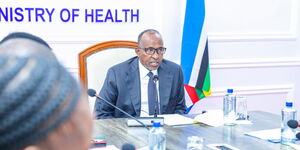Ministry of Health Chief Administrative Secretary (CAS), Dr. Aman Rashid has said cancer remains a major public health concern in Kenya with Cervical Cancer being the second most common cancer and the leading cause of cancer deaths among women.
Kenya is classified among the top twenty high Cervical Cancer burdened Countries globally with an estimated 5,236 new cases recorded last year with 3,211 succumbing to the disease.
Due to disruptions caused by Covid-19, many Kenyans have withdrawn from seeking medical services. This in turn made it difficult for the Health sector to get the latest statistics on cervical cancer cases in the country this year.
“Our vision at the Ministry is that no woman or child should be left behind. We endeavor to ensure that every eligible child is immunized and gets an opportunity to survive and thrive and that every woman 25-49 years is screened regularly as per our National Cancer Screening Guidelines of 2018,” Rashid said.
Peter Kamau, from the ministry of Health Vaccines Department, said the cost of treating cancer is very high yet it is a preventable disease though awareness on cancer prevention, screening and early treatment.
Worldwide, the disease ranks as the fourth most frequently diagnosed cancer and the fourth leading cause of cancer death in women. Cervical cancer also ranks second behind breast cancer in low-income countries.
The human papillomavirus (HPV) is the main cause of cervical cancer but is also a sexually transmitted disease. Most sexually active people will have HPV at some point in their lives, but few women will get cervical cancer.
According to Dr. Khadija Warfa, Consultant Gyn-oncologist at Aga Khan University Hospital Nairobi, "Other factors that can increase the risk of cervical cancer are intimacy at an early age, multiple sexual partners, sexually transmitted diseases, HIV and cigarette smoking."
Kenya is one of the few African countries to have introduced the HPV vaccine for free in Africa in October 2019, targeting 800,000 girls. The country's now routine immunization procedure has however managed to reach 360,000 girls due to Covid-19 interruptions.
According to the CAS, the Ministry has in the last one year installed equipment and infrastructure in over 3,000 Health Facilities to support the introduction of the vaccine countrywide. He added that 1,000 health facilities are also expected to receive facilities in the next year.
“These equipment have greatly improved access to immunization Services in the Country,” he said.












